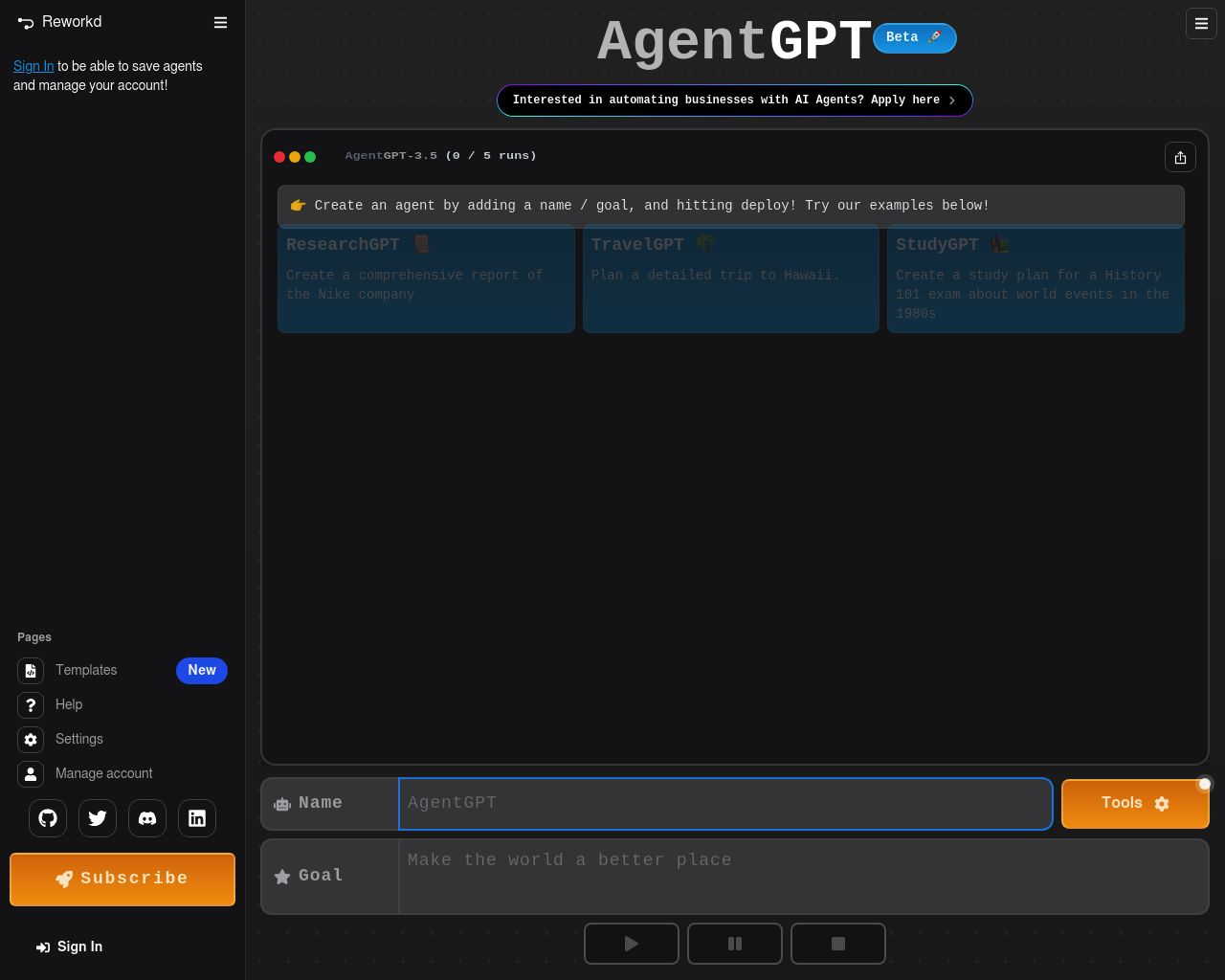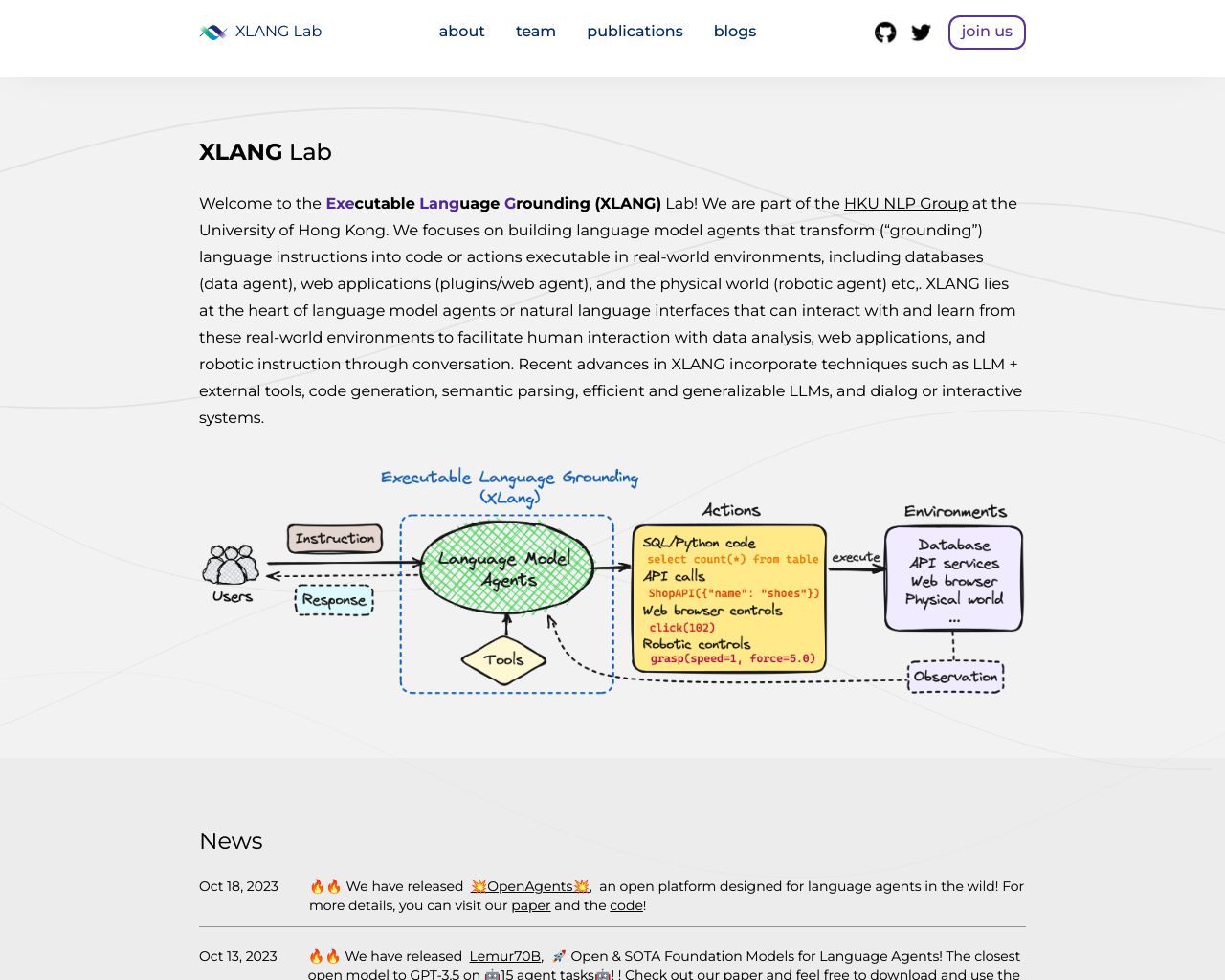Comprehensive Comparison Between AgentGPT and OpenAgents
The artificial intelligence landscape shifts rapidly, demanding powerful yet accessible tools to harness AI’s transformative potential. This review compares AgentGPT, OpenAgents, and SmythOS—three platforms at the forefront of AI agent development. AgentGPT offers autonomous, goal-oriented agents with impressive memory management. OpenAgents provides specialized tools for data analysis, plugin integration, and web browsing. SmythOS emerges as a comprehensive solution, combining the strengths of its competitors while addressing their limitations. We evaluate each platform’s features, use cases, and overall utility to help readers make informed decisions about integrating AI agents into their workflows.
AgentGPT Overview
AgentGPT empowers users to create and deploy autonomous AI agents directly in a web environment. Unlike traditional chatbots, these agents tackle broad, goal-oriented tasks with impressive efficiency.


The platform stands out with its robust feature set. User authentication systems enhance security, while the ability to save and share agent runs fosters collaboration. Dynamic translations break language barriers, expanding global accessibility. AI model customization allows users to tailor agents to specific needs, and web browsing capabilities extend the agents’ reach beyond predefined data sets.
AgentGPT empowers users to create and deploy autonomous AI agents directly in a web environment. Unlike traditional chatbots, these agents tackle broad, goal-oriented tasks with impressive efficiency.
AgentGPT’s use of vector databases for memory management sets it apart. This technology enables AI agents to retain execution history and access long-term memory, significantly enhancing their functionality over extended periods. The platform’s scalability shines through its cloud offering, seamlessly integrating with tools like LangChain for enhanced capabilities.
While AgentGPT offers impressive capabilities, it lacks some advanced features found in other platforms. The absence of a visual builder or no-code editor may pose challenges for non-technical users. Additionally, the platform doesn’t explicitly mention features for explainability, transparency, or debug modes, which could be crucial for complex deployments.
Despite these limitations, AgentGPT’s commitment to accessibility and continuous evolution, driven by community contributions, positions it as a valuable tool for businesses and individuals looking to harness the power of AI agents. Its ability to streamline operations, boost efficiency, and enable informed decision-making makes it a compelling choice in the rapidly evolving landscape of AI technologies.
OpenAgents Overview
OpenAgents introduces a versatile platform for integrating AI agents into daily life, focusing on three specialized agents: Data Agent, Plugins Agent, and Web Agent. The Data Agent excels in complex data analysis tasks, making it valuable for roles requiring in-depth data insights. The Plugins Agent stands out with over 200 integrated plugins, offering unparalleled versatility for a wide range of daily activities. The Web Agent employs a Chrome extension to automate web browsing, enhancing online navigation efficiency.
OpenAgents introduces a versatile platform for integrating AI agents into daily life, focusing on three specialized agents: Data Agent, Plugins Agent, and Web Agent.


OpenAgents’ platform emphasizes user-friendliness with a web UI and backend server, making it accessible to non-expert users while providing powerful tools for professionals. The extensive plugin integration of the Plugins Agent offers a broad spectrum of tools for everyday tasks, from checking weather to online shopping and accessing scientific data. The Data Agent’s proficiency in handling complex data operations distinguishes it as a powerful tool for professionals needing data insights.
The extensive plugin integration of the Plugins Agent offers a broad spectrum of tools for everyday tasks, from checking weather to online shopping and accessing scientific data.
While OpenAgents offers innovative features like autonomous web browsing and extensive plugin integration, it lacks some advanced capabilities. The platform doesn’t include a visual builder or no-code editor, which could limit accessibility for non-technical users. Additionally, there’s no mention of features like explainability, debug mode, or multi-agent collaboration, which are increasingly important in complex AI applications.
OpenAgents has released a platform with a backend code for hosting agents, a frontend UI, and a Chrome extension for the Web Agent. The system is adaptable, allowing for deployment on localhost and integration of new agents and plugins. However, the absence of features like audit logs, work scheduling, and advanced security measures like data encryption may be a concern for enterprise-level users or those dealing with sensitive data.
The vision of OpenAgents is to create an open platform that integrates language agents into daily life, bridging the gap between expert and non-expert users. They aim to provide tangible solutions in practical contexts like data analysis, web browsing, and task automation. While this approach offers valuable tools for everyday AI integration, users requiring more specialized or enterprise-grade features might find the platform’s capabilities limiting for complex or large-scale applications.
The vision of OpenAgents is to create an open platform that integrates language agents into daily life, bridging the gap between expert and non-expert users.
Feature Comparison
AgentGPT and OpenAgents offer distinct approaches to AI agent development, with notable differences in their feature sets. AgentGPT excels in autonomous agent creation, providing a web-based platform for deploying goal-oriented AI agents. Its use of vector databases for memory management enables agents to retain execution history, enhancing long-term functionality. However, AgentGPT lacks a visual builder or no-code editor, potentially limiting accessibility for non-technical users.
OpenAgents, conversely, focuses on specialized agents for data analysis, plugin integration, and web browsing. Its Data Agent handles complex data operations, while the Plugins Agent boasts over 200 integrated plugins for various daily tasks. The Web Agent’s Chrome extension for autonomous web browsing sets it apart. Yet, OpenAgents also lacks a visual builder and advanced features like explainability or debug modes.
Neither platform offers robust security features like data encryption or constrained alignment, which SmythOS provides. SmythOS’s visual builder, no-code options, and advanced security measures address these gaps, offering a more comprehensive solution for AI agent development and deployment.
Feature Comparison Table
| AgentGPT | OpenAgents | SmythOS | |
|---|---|---|---|
| CORE FEATURES | |||
| Visual Builder | ❌ | ❌ | ✅ |
| No-Code Options | ❌ | ❌ | ✅ |
| Explainability & Transparency | ❌ | ✅ | ✅ |
| Human-AI Interaction | ❌ | ✅ | ✅ |
| Agent Work Scheduler | ✅ | ❌ | ✅ |
| SECURITY | |||
| Constrained Alignment | ❌ | ❌ | ✅ |
| IP Control | ❌ | ❌ | ✅ |
| COMPONENTS | |||
| Foundation AIs | ❌ | ✅ | ✅ |
| Data Lakes | ❌ | ❌ | ✅ |
| DEPLOYMENT OPTIONS (EMBODIMENTS) | |||
| Staging Domains | ❌ | ❌ | ✅ |
| Production Domains | ❌ | ❌ | ✅ |
| Deploy as Scheduled Agent | ❌ | ❌ | ✅ |
| DATA LAKE SUPPORT | |||
| Hosted Vector Database | ✅ | ❌ | ✅ |
| Sitemap Crawler | ❌ | ❌ | ✅ |
| YouTube Transcript Crawler | ❌ | ❌ | ✅ |
Best Alternative to AgentGPT and OpenAgents
SmythOS stands out as the superior alternative to AgentGPT and OpenAgents, offering a comprehensive platform for AI agent development and deployment. Our drag-and-drop interface eliminates the need for extensive coding knowledge, making AI accessible to a broader audience. We provide pre-built API integrations and templates, significantly reducing setup time and allowing users to focus on innovation.
SmythOS stands out as the superior alternative to AgentGPT and OpenAgents, offering a comprehensive platform for AI agent development and deployment.
Unlike AgentGPT and OpenAgents, SmythOS offers a visual builder and no-code options, addressing a critical gap in accessibility. Our platform supports multi-agent collaboration, enabling teams of AI agents to work together on complex tasks. This feature enhances efficiency and scalability, surpassing the capabilities of both AgentGPT and OpenAgents.
Security is a top priority for SmythOS. We implement advanced features like constrained alignment and data encryption, ensuring that AI behavior aligns with organizational goals and ethical guidelines. These crucial security measures are notably absent in both AgentGPT and OpenAgents, making SmythOS the clear choice for enterprises concerned with data protection and compliance.
We implement advanced features like constrained alignment and data encryption, ensuring that AI behavior aligns with organizational goals and ethical guidelines.
SmythOS’s versatility shines through its deployment options. We support various embodiments, including API, webhook, site chat, and scheduled agents. This flexibility allows seamless integration into existing systems, a capability not fully realized by AgentGPT or OpenAgents. Our platform scales efficiently, supporting enterprise-level deployments while maintaining performance and responsiveness—a critical factor for growing businesses.
In essence, SmythOS offers a more robust, secure, and user-friendly solution for AI agent development and deployment. Our platform bridges the gap between advanced AI capabilities and practical business applications, making it the ideal choice for organizations looking to harness the full potential of AI technology.
Conclusion
AgentGPT and OpenAgents offer unique approaches to AI agent development, each with distinct strengths. AgentGPT excels in autonomous agent creation and memory management, while OpenAgents shines with specialized agents for data analysis, plugin integration, and web browsing. However, both platforms lack certain advanced features crucial for enterprise-level applications.
SmythOS addresses these limitations and emerges as the superior choice for AI agent development and deployment. Our platform combines the strengths of AgentGPT and OpenAgents while offering additional advanced features. SmythOS provides a visual builder and no-code options, making it accessible to both technical and non-technical users. Our platform’s robust security measures, including data encryption and constrained alignment, ensure safe and reliable AI agent operations.
With SmythOS, users gain access to a comprehensive suite of tools for creating, deploying, and managing AI agents across various environments. Our platform’s versatility allows for seamless integration with existing systems, while our extensive library of pre-built components and templates accelerates development. Whether you’re a developer seeking advanced API integrations or a business leader looking for scalable AI solutions, SmythOS offers the tools and capabilities to meet your needs.
Experience the future of AI agent development with SmythOS. Explore our diverse range of AI-powered agent templates to jumpstart your projects, or create a free account to start building your own custom AI agents today. With SmythOS, you’ll revolutionize your workflow and unlock the full potential of AI for your business.
Last updated:
Disclaimer: The information presented in this article is for general informational purposes only and is provided as is. While we strive to keep the content up-to-date and accurate, we make no representations or warranties of any kind, express or implied, about the completeness, accuracy, reliability, suitability, or availability of the information contained in this article.
Any reliance you place on such information is strictly at your own risk. We reserve the right to make additions, deletions, or modifications to the contents of this article at any time without prior notice.
In no event will we be liable for any loss or damage including without limitation, indirect or consequential loss or damage, or any loss or damage whatsoever arising from loss of data, profits, or any other loss not specified herein arising out of, or in connection with, the use of this article.
Despite our best efforts, this article may contain oversights, errors, or omissions. If you notice any inaccuracies or have concerns about the content, please report them through our content feedback form. Your input helps us maintain the quality and reliability of our information.
